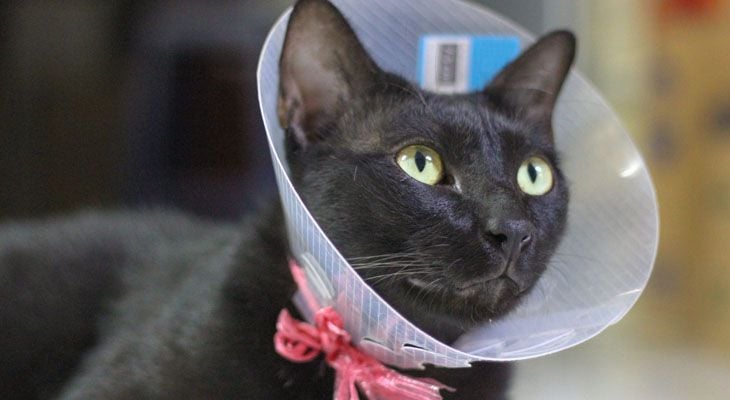
Unless you plan on breeding your cat, spaying or neutering it is the best way to slow down feline overpopulation. Many cats that are born each year end up in overcrowded shelters or are abandoned in the wild. Spaying or neutering your cat early in its life can prevent this unnecessary suffering.
Benefits of Spaying and Neutering
Spaying involves the removal of a female cat’s reproductive organs, or ovaries. Neutering is the removal of a male cat’s testicles, also known as castration.
Female cats that are spayed between 3 and 6 months old have a lower risk of developing certain health problems later in life, such as:
- Mammary (breast) cancer
- Pyometra, a potentially fatal condition in which the reproductive organ collects pus
- Vaginal hyperplasia, an unusual swelling of the wall of the vagina during the cat’s heat cycle
- Other cysts, infections or cancers that affect the ovaries or uterus
Removing the testicles from male cats early in their life can prevent several health problems and behaviors, including:
- Testicular cancer
- Enlargement of the prostate gland and possibly cancer of the prostate
- Behaviors caused by the male hormones made by the testicles, such as roaming, aggressiveness and marking their territory by spraying with urine
Spaying and Neutering Procedures
Spaying
The entire spaying procedure takes around 15 or 20 minutes, unless there are complications. Before the procedure, the cat will be given anesthesia so she sleeps through the procedure and does not feel pain.
Female cats have two ovaries that contain many eggs (ova). During surgery, both ovaries will be removed. This requires the veterinarian to make a cut (incision) in the cat’s abdomen. After the surgery, the incision is then sewn shut with stitches (sutures).
About an hour after surgery, the cat will be able to move around. Female cats will often be kept in the clinic overnight, so the veterinary staff can monitor their condition. If the cat goes home on the day of the surgery, she will need to be watched closely. She should also be kept as still as possible for a week after the procedure to make sure the incision does not open up.
Neutering
Before the neuter procedure, a male cat is given anesthesia, and the scrotum is shaved and washed. The veterinarian will remove both testicles through two incisions in the scrotum. As with female cats, male cats may be kept overnight, so they can be monitored.
Both male and female cats should fully recover within two weeks after the spay or neuter procedure. During that time, keep an eye on your cat’s health and activity level. Report any concerns to your feline veterinarian.
Pediatric Spaying and Neutering
Many veterinarians recommend spaying or neutering cats between 5 and 7 months of age. Performing the procedure earlier, however, can prevent some of the problems that come once a cat hits puberty.
If a male cat is not neutered before it reaches puberty, it may start fighting with other cats or marking its territory by spraying. Female cats can become pregnant as young as 4 months of age. Spaying them early on in life can prevent unintended pregnancies.
Some veterinarians spay or neuter cats as young as 6 weeks of age. These procedures are similar to those for older cats; although they require special precautions. The veterinarian should be trained specifically to perform this type of surgery on younger cats.
Kittens that are spayed or neutered at a young age do not have more complications from the surgery than when it is performed on older cats. More research, though, is needed to make sure that doing these surgeries this early is safe for the cats over the long run.
If your cat has not been spayed or neutered or you have any questions about the process, please contact our office. We are happy to schedule an appointment or provide additional information.

